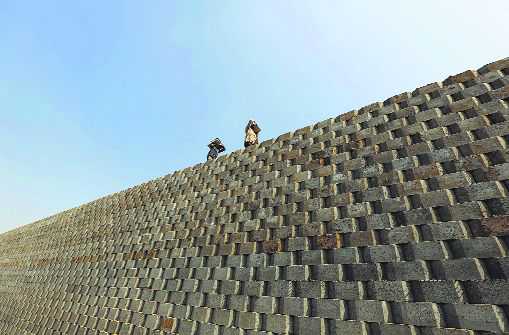
THE ROADBLOCK: The real deficit is not fiscal but of governance and the inability of states to use resources effectively.
Subir Roy
Senior economic analyst
Leaders in independent India have won historic electoral victories riding on economic slogans. In 1971, Indira Gandhi won decisively after splitting the Congress by using, among other things, the slogan ‘Garibi Hatao’. In 2014, Narendra Modi won an equally decisive victory by using, among other things, the slogan ‘Sabka Saath Sabka Vikas’.
The campaign for the 2019 elections also began with economic issues taking centre stage. The Opposition narrative centred around several points. One, Modi has failed to bring about vikas; singularly absent are the 1 crore new jobs promised. In fact, 1.1 crore jobs were lost in one year alone, 2018. Two, there has been widespread rural distress. Three, the attempt to address this has led to debates on the efficacy of actions like the farm loan waiver and income support to farmers. Four, those who look a little further ahead ask what kind of compulsions will these moves impose on the new government which will come in and whether India is inexorably moving towards fiscal stress.
India gave every sign of being a healthy democracy in action in which real contentious issues were being vigorously debated. But then came the Pulwama terror attack and the military actions by India and Pakistan that followed. This shifted the focus of public discourse to the country’s security and territorial integrity.
The problem with this latest development is that there is little to discuss when it comes to national security. All parties agree that the territorial integrity of the country has to be maintained at all costs. So, political argument has deteriorated to calling one another names, questioning the patriotism of the opponent, and a jingoistic mood has swept the country. Those pointing out the futility and social cost of war have been branded as anti-national. Even a woman who was made a widow by the Pulwama devastation has not been spared. Economic issues (you can’t even protect the borders if the government is resource- strapped) have gone out of the window.
It is critical to understand what this means for the future of India as a democracy and its evolution into a more and more mature one. In the run-up to the US presidential elections in 2020, key issues which are now being hotly debated are universal state-supported healthcare, income support and taxing the rich more. Mature and self-assured nations spend a limited amount of time debating issues of national security. Their main focus, since they have won the battle for development, is on the issue of well-being. How best does a society, which has the necessary resources and is not worried about military threats, use those resources to create happiness? Increasingly, public interest is shifting to the usefulness of newly created global happiness indices.
Tracing how the world has evolved through the last century can help us identify a rational path that India can follow in order to become not just a mature economy, but also a self-assured society. The death of millions of bright young men in the two world wars led to a period of cold war in which nuclear-armed powers stepped back from war because of the threat of mutual assured destruction.
The end of communist regimes meant not just the elimination of one model of economic organisation, but also the emergence of a unipolar world in which market-friendly policies ruled and political systems focused more and more on governance and transparency. And as the threat of global warming has loomed, focus has turned on sustainable economic practices and pursuit of a proper quality of life instead of maximising consumption.
It is vital for India to see where it can fit into this historical process. Now that nearly three decades of post-liberalisation economic policies have laid the foundation of sustained high growth, the policy focus has to shift to addressing stubborn pockets of poverty instead of widespread poverty which characterises underdevelopment. It is increasingly becoming clear that individual states and regions in India remain poor not because of lack of resources but their inability to use them effectively. The real deficit is not fiscal but of governance. Simultaneously, developing nations stand to bear the brunt of the impact of global warming. India faces a related critical long-term problem of water scarcity. Melting Himalayan glaciers will soon put an end to the perennial flows in its rivers even as groundwater is being depleted.
These are the key issues which should be driving public discourse in India and not which party is more patriotic and which is more suited to ensuring national security. Issues like defence of the realm and national security should be placed beyond the realm of partisan conflict. The protection of India’s borders has to be left in the hands of its trained and professional armed forces which should be insulated from politics.
What needs addressing is internal security. If an increasing number of militants are turning out to be home-grown, it requires critical attention. The PM made a timely public intervention which put a stop to attacks on Kashmiris across the country. The way to address alienation is to reduce tension and then keep interacting intensively. As recent tension in the Northeast has shown, different parts of the country are in different stages of national integration. Adopting a one-size-fits-all perception and muscular approach will not do. Dialogue will.
Fortunately, latest news reports indicate that the BJP leadership has asked its spokespersons to focus not only on national security, but also on economic development and effective delivery mechanism. Too much of ‘jingoism’ will divert attention from the party’s record of good governance. Hopefully, this will bring real issues back to the centre stage.



























